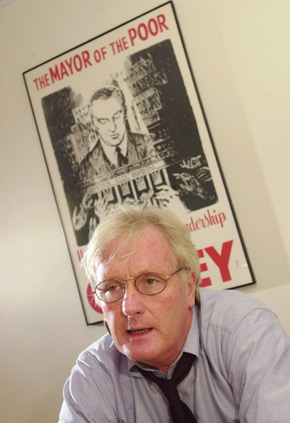Gifts help mental health efforts

The Community Gifts Through Harvard Campaign bears a special burden this year. The terrorist attacks of Sept. 11 have created both material and psychological needs for many individuals. Even those not directly affected by the attacks have been shaken by them in ways that may not be immediately apparent.
According to Carol Steinman, manager of the Faculty and Staff Assistance Program, these needs are quite apparent from the numbers of people seeking help with personal problems in recent weeks.
“Since Sept. 11,” Steinman said, “the Faculty and Staff Assistance Program has seen an increase in persons seeking counseling help. People who had personal stress issues prior to Sept. 11 often experience them as unmanageable after the terrorist acts. In addition we see clients who suffered previous trauma in their lives and the events of Sept. 11 reactivated these earlier traumas. It is also clear that clients who pursue help around other issues invariably discuss their response to Sept. 11.”
Other agencies report similar increases. Tim O’Leary, deputy director for policy and research for the Boston-based Massachusetts Association for Mental Health (MAMH), said that fears and anxieties among school children have risen noticeably. His organization has been instrumental in providing counseling services to deal with these fears.
But MAMH responds to other concerns as well, many of them of long-standing duration. The organization works with legislators, journalists, and other members of the community to change attitudes toward the mentally ill. It is slow work, but O’Leary believes in the power of accurate information to dispel stereotypes and correct misconceptions.
“When you give people the facts, nine times out of 10, you can trust them to do what needs to be done.”
Working to improve conditions for the mentally ill since its inception in 1911, MAMH directs much of its efforts toward the Massachusetts State House, whose golden dome is literally a stone’s throw from the organization’s Bowdoin Street office. O’Leary is well qualified to negotiate the intricacies of state government, having served as representative from Melrose in the 1980s.
One of MAMH’s initiatives is the Changing Minds program, an effort to “raise awareness about mental illness and the effectiveness of treatment.” The organization has conducted a series of talks and seminars aimed at lawmakers, journalists, school administrators, and others in an effort to clear up misconceptions about mental illness.
“It’s a proactive campaign,” O’Leary said. “We’ve held meetings with the media and connected them with psychiatrists who can answer their questions about mental illness. We’ve even brought in people with schizophrenia to talk with legislators and reporters.”
O’Leary emphasized that MAMH never takes a scolding tone in its efforts to combat the stigma connected with mental illness.
“That’s not an effective way of changing people’s minds. You have to recognize that these are decent people who just need to be educated about what mental illness is.”
Another program that has achieved notable results is called People Are Waiting, a systematic effort to decrease the amount of time the mentally ill must wait for housing, residential services, and rental assistance.
The organization documented more than 3,000 adult clients of the Department of Mental Health (DMH) and over 100 children and adolescents who were on waiting lists for housing and residential services. This information was then provided to legislators so that they could attend to the cases that fell within their districts. The program has helped to conserve state resources by moving clients through the system more expeditiously.
“Now the DMH commissioner has begun updating the list every quarter, and this year for the first time we’ve seen the legislature vote new money to shorten the waiting lists,” O’Leary said.
The organization has also played a significant role in connecting individuals with the mental health services they need. One notable success occurred about four years ago when a series of teen suicides in South Boston left parents and school administrators feeling frightened and helpless.
Steven Lynch, at that time a state senator from the district, appealed to MAMH for help. The organization sent over one of its board members, a psychiatrist with expertise in this area who helped set up a peer awareness program to spot teens at risk for suicide. This and other measures to deal with mental illness among the student population helped to stem the cluster of suicides that was plaguing the community.
The organization is small. Besides O’Leary, the only full-time staff members are Bernard Carey, executive director, and Sean Carey, who runs Kids on Campus, a mentoring program that connects local youngsters with student tutors from Boston College. But with nearly a century of active service and a 60-member board of directors, many with medical and legislative expertise, MAMH wields more clout than might be expected.
Working steadily and quietly, the organization has changed more than a few minds about mental illness over the years. O’Leary says that he has seen the public’s level of knowledge and acceptance rise noticeably over the past decade. Much of this progress is attributable to MAMH’s positive approach.
“You will almost never see our name in the paper criticizing a legislator,” O’Leary said. “One thing you learn is there’s always another train leaving the station.”
You can contribute to MAMH by making a pledge to the United Way of Massachusetts Bay.




